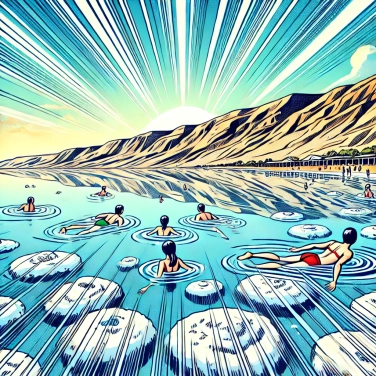The Dead Sea is so salty because of the rapid evaporation of water, the lack of outlets for salts, and the influx of salts from rivers.

The Dead Sea is located in a region with a very hot and dry climate. As a result, due to these high temperatures and the strong sun shining all year round, evaporation is extremely fast and intense. The water that evaporates leaves behind all the salts and minerals it contains. The result: the amount of water decreases but not the amount of salts, which therefore become highly concentrated. And the more the water disappears, the more these salts become numerous and densely present in what remains of the water, which explains why the Dead Sea is one of the saltiest bodies of water in the world.
The Dead Sea has no outlet to the ocean: it is a kind of water dead end. Water flows in, but finds no way out, so it remains trapped there under a burning sun. With the heat, the water constantly evaporates; however, the mineral salts do not evaporate. As a result, they accumulate quietly year after year, significantly increasing the salinity. It's a bit like continuously filling a container with saltwater while letting the water evaporate in the sun: after a while, it would become very salty inside. This is exactly what happens with the Dead Sea, stuck in a dead end where the salts eventually pile up.
Most of the salts in the Dead Sea simply come from the rivers in the surrounding area, notably the Jordan. As they flow through rock and soil, these waterways collect a lot of minerals and dissolved salts, such as sodium chloride, calcium, and magnesium, and bring them directly into this closed lake. Since it has no outlet to an ocean, all these salts remain trapped here, eventually accumulating year after year. As a result, the amount of salts only continues to increase since the water evaporates but these minerals never disappear. That’s why these external contributions play a significant role in the extreme salinity of the Dead Sea.
The Dead Sea region has a hot and particularly dry climate, which accentuates strong evaporation. Less water means more concentrated salt, that's logical. Added to this is the nature of the local soils: composed of saline rocks, they gradually release mineral-rich salts. These minerals become trapped in the sea with no way to be flushed out elsewhere. Without sufficient rain to dilute all of this, salinity rises very quickly. In short, the combination of intense evaporation with the particular geology explains this exceptional accumulation of salt.
The name 'Dead Sea' comes from the fact that its extreme salinity nearly prevents any aquatic life; however, some bacteria and microscopic organisms can still survive in these extreme conditions!
The Dead Sea contains numerous beneficial minerals, including magnesium, potassium, and calcium, known for their therapeutic properties and used in various dermatological treatments.
Thanks to its very high salt concentration, the density of the Dead Sea water allows swimmers to float effortlessly on the surface.
Every year, the water level of the Dead Sea decreases by about 1 meter, primarily due to high evaporation and a reduction in water inflows from surrounding rivers.
Yes, it is possible to swim there, but it is important to avoid prolonged contact with the water and to protect your eyes and any potential wounds, as the salt can cause intense irritation.
Due to its extreme salinity, the Dead Sea is generally uninhabitable for most forms of marine life. Only a few specialized bacteria and single-celled organisms can survive there.
The Dead Sea is rich in minerals such as magnesium, potassium, calcium, and bromide. These minerals are exploited for their benefits in cosmetics, health, and agriculture.
Sure! Here’s the translation: "Yes, its salinity can fluctuate according to the input of freshwater, evaporation rates, and climate changes. Currently, its salinity tends to increase because the Dead Sea is shrinking rapidly."
The very high salt concentration greatly increases the density of the Dead Sea water, allowing the human body to float with extraordinary ease.

No one has answered this quiz yet, be the first!' :-)
Question 1/5